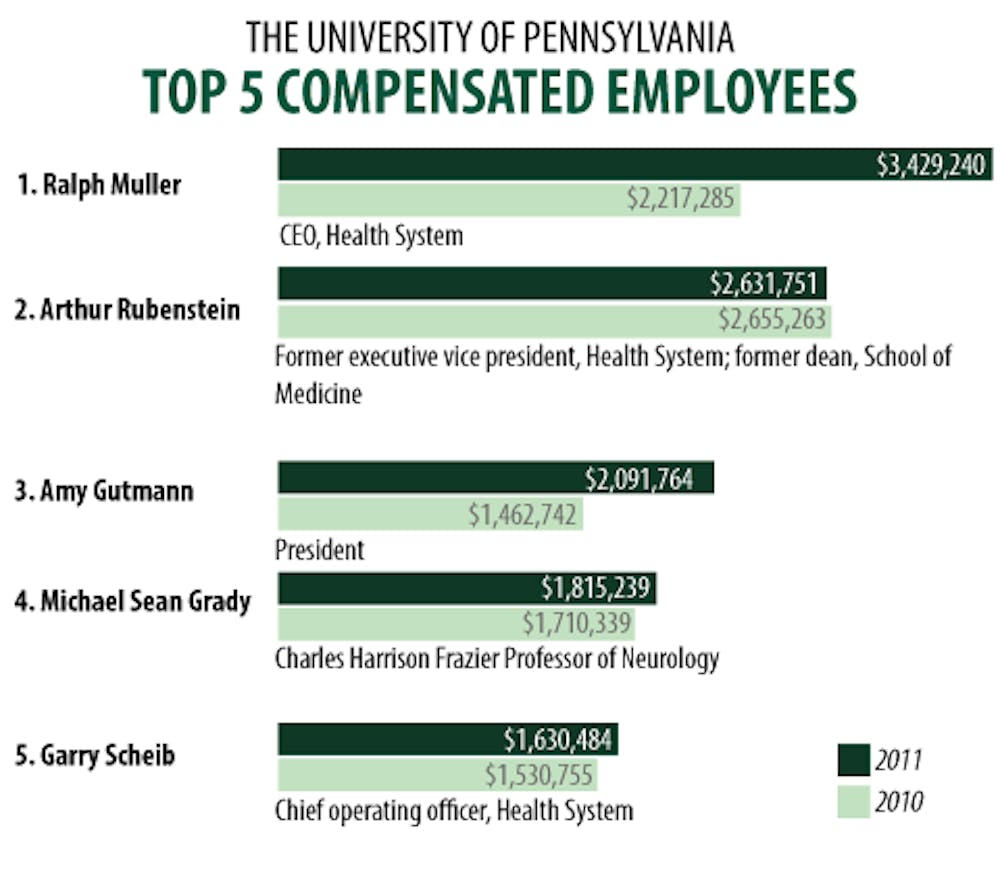
Penn President Amy Gutmann has officially joined the $2-million club.
Gutmann received a $2,091,764 compensation package in 2011, according to the University’s most recent tax filing. That total marks the first time that her compensation, long among the top ranks of private university presidents, has surpassed the $2-million mark.
Gutmann’s 2011 compensation comes as a 43-percent hike from the $1,462,742 she earned in 2010 — the largest calendar year salary bump she has received throughout her presidency. Much of that increase was due to her base salary growth, which rose from $914,724 in 2010 to $1,078,016 in 2011.
Apart from a slight drop in compensation in 2009, Gutmann’s salary has increased steadily since she came to the helm at Penn. Her 2011 package marks a more than 170-percent increase from the $767,030 she received in the 2005 fiscal year, her first year at the University.
Because of lag times in Internal Revenue Service reporting requirements, 2011 is the most recent year for which Penn’s compensation totals are available.
INTERACTIVE: President Gutmann’s compensation
Compensation data for each Ivy League institution in 2011 is not yet available, but Gutmann has in recent years placed consistently as the third-highest-paid Ivy president, behind only Columbia University’s Lee Bollinger and Yale University’s Richard Levin. Levin stepped down from the presidency earlier this year; when 2013 Ivy League tax filings become available, some compensation consultants said, it is likely that Gutmann will take the second spot on the Ivy list.
When discussing Gutmann’s compensation, Board of Trustees Chair David Cohen, who heads the committee that determines the president’s annual salary, has consistently said he believes that Penn has the best University president in the country, and that she should be paid accordingly.
“By any measure,” he said in an email, “President Gutmann has had an incredible tenure at Penn, and her salary justifiably reflects that.”
Much of Gutmann’s annual compensation is performance based — achievements like fundraising success and faculty recruitment increase her bonus package and incentivized pay each year. Penn, compared to its peer institutions, places a high degree of emphasis on incentive-laden pay.
In 2011, the year in which the University hit its $3.5-billion goal in the Making History fundraising campaign, Gutmann received a $235,000 increase in her bonus payout as compared to 2010, Cohen said.
In 2010, Gutmann was the 12th-highest-paid private university president in the nation, according to a report last year by The Chronicle of Higher Education. After seeing that report, Cohen said, the compensation committee was struck that Gutmann had not placed in the top 10. Given the scale and complexity of Penn, as well as Gutmann’s performance, he said, the compensation committee believed it needed to adjust Gutmann’s compensation to bring it more in line with her peers.
In the Chronicle’s report on 2010 compensation, five private university presidents received compensation packages of $2 million or more. The next report on presidential compensation, which will contain data for 2011, is expected later this year.
Some compensation consultants said they found Cohen’s rationale unusual. “It seems odd for a company to approach its compensation on the basis of saying, ‘We want a certain individual to be compensated in a way that would put them in the top 10 nationwide,’” said Mark Borges, a principal at Compensia, Inc., a compensation consulting firm. “It would seem to me that you compensate not on what the year-end ranking is going to be, but on the quality of the performance by the individual.”
At a time when President Barack Obama is trumpeting the cause of lower college costs, Gutmann’s most recent compensation report is likely to provide fodder to critics of executive pay inflation, who argue that higher-education officials should not be receiving seven-digit salaries. In the fall of 2011, at the height of the Occupy Wall Street movement, Gutmann’s compensation became a rallying cry for student protesters, who said that the president’s salary was an insult to lesser-paid workers at Penn and in Philadelphia.
It is possible, said Paul Dorf, managing director of Compensation Resources, Inc., that Gutmann’s $2-million-plus package in 2011 could produce a similar response from some pockets of campus, as well as throughout academe more broadly. He added, though, that a $2-million salary today is much less significant than a $1-million package was years ago.
Gutmann’s 2011 compensation was nearly 12 times larger than the $177,139 that an average full professor at Penn made in 2010-11, according to a report on the economic status of the faculty released earlier this year. The average pay for full professors at Penn ranks seventh among private institutions nationwide, according to a Chronicle of Higher Education report released last week.
Like in previous years, Gutmann’s compensation in 2011, though sizable, was not the largest at the University. That distinction belonged to Ralph Muller, CEO of the health system, who earned $3,429,240. Of the 14 employees whose total compensation exceeded $1 million in 2011, up from 11 employees the year before, 12 were affiliated with the health system or medical school.
Gutmann’s compensation, many consultants agree, is likely much less than what she could earn working outside of higher education. As the college presidency has grown to require more of a mastery of fundraising, Borges said, skills like Gutmann’s are increasingly prized by an institution like Penn.
“Compared to other industries,” he said, “she’s probably a bargain.”
The Daily Pennsylvanian is an independent, student-run newspaper. Please consider making a donation to support the coverage that shapes the University. Your generosity ensures a future of strong journalism at Penn.
DonatePlease note All comments are eligible for publication in The Daily Pennsylvanian.








